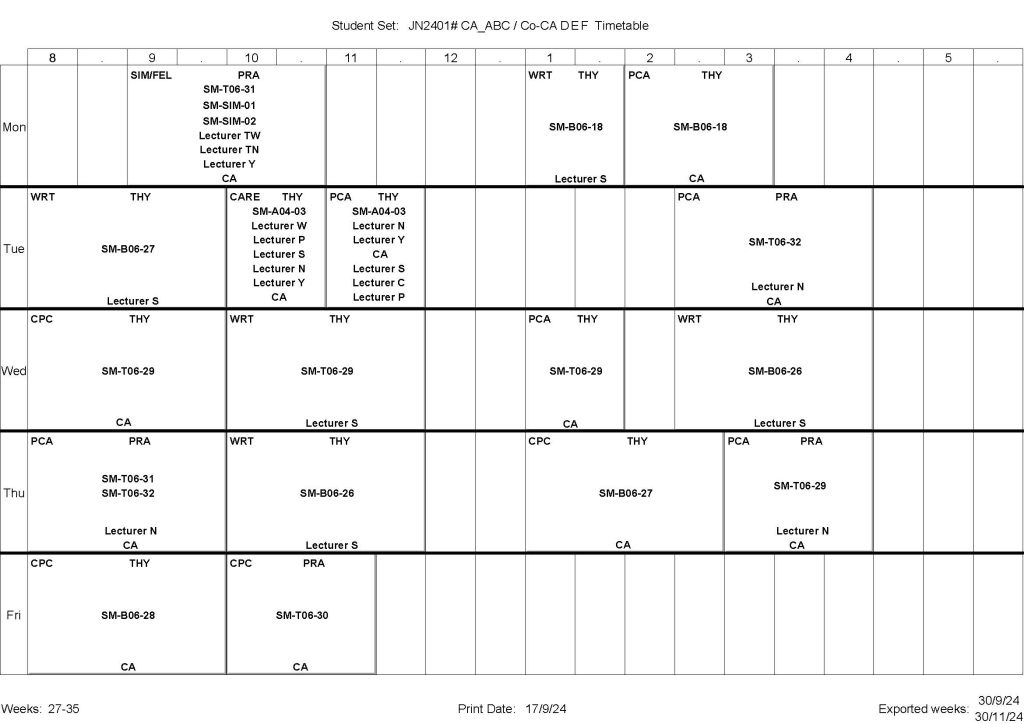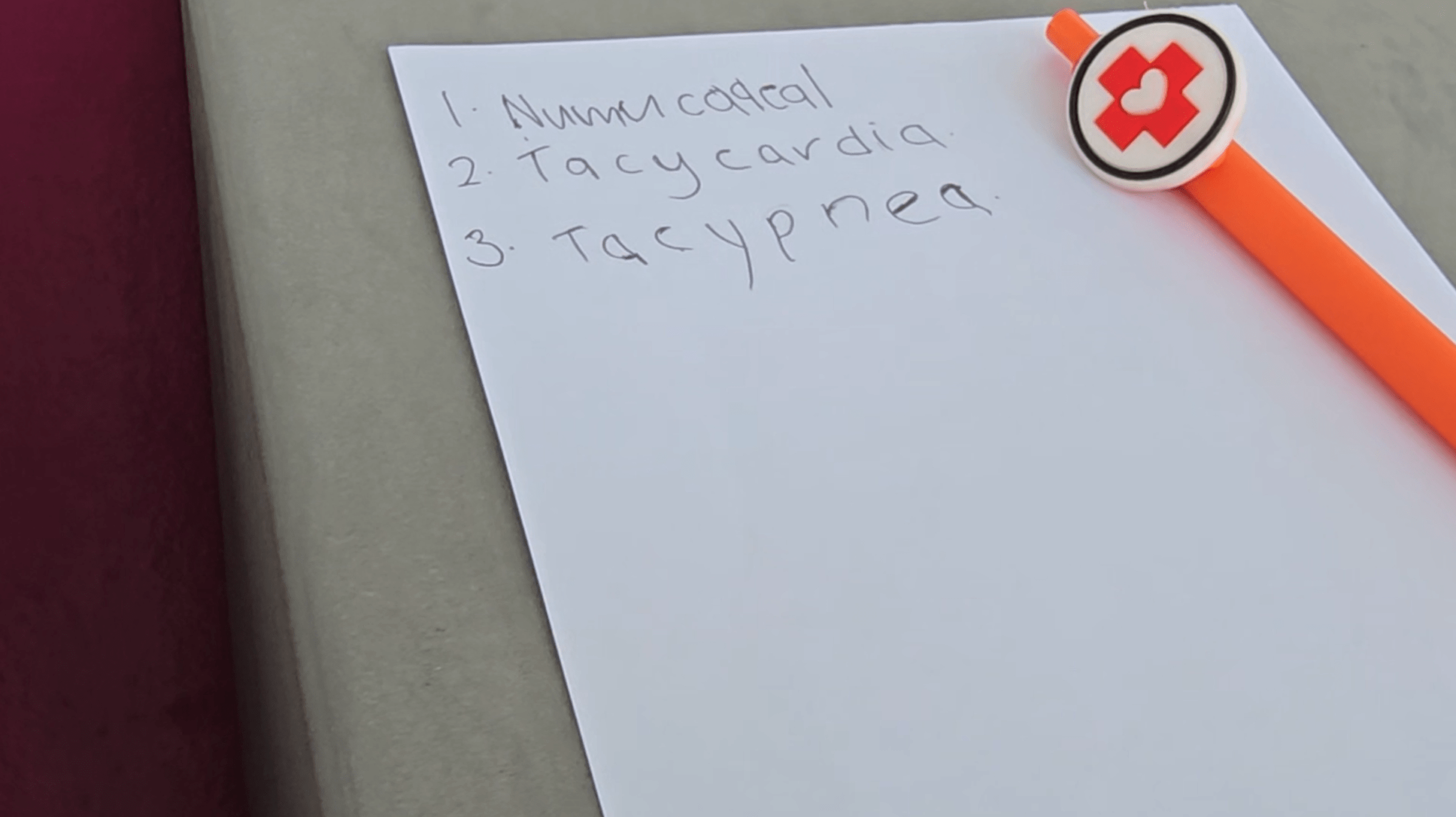Term 1.3 starts on the 30 September 2024 (Monday). Around a week before, on 19 September, our Class Advisor (CA), who has been with us for the past two in-campus terms (Term 1.1 and 1.2), said farewell to us in the WhatsApp group and left the group on the following day together with my three other classmates who will be joining another class through the 2.25 year accelerated programme, the 2-year Higher Nitec in Nursing (April 2024) intake. It is rare to find such a good CA, as she always goes the extra mile to provide a detailed explanation with rationales for every nursing action, unlike others for the sake of memorising, where they give hints at the answers that would be out for Class Tests. It’s sad to see the other three classmates leaving, too, as the class has not felt livelier since they left.

On 23 September 2024, our new CA has given us the timetable for Term 1.3.

| Week | Schedule |
|---|---|
| 4 | Patient Care A (PCA) Practical Test |
| 5 | Cancer and Palliative Care (CPC) Class Test |
| 5 | Writing 101 (WRT) Individual Writing Assignment Submission (Draft) |
| 6 | PCA Class Test |
| 6 | WRT Individual Assignment Submission (Final) |
| 6 | CPC Project Submission |
| 7 | Writing 101 Class Test |
| 7 | CPC Group Presentation |
| 8 | WRT Video Submission |
| 9 | PCA Exam |
| 10 | Term Break (30 Nov 24 – 12 Jan 25) |
I am still in the 3-year Higher Nitec in Nursing (January intake), so I can only share the 3-year curriculum with you. The 2-year Higher Nitec in Nursing has fewer modules and only requires 96 out of 120 credits, so they do not have to take a particular module. However, they have to take up to two additional modules per term, which is quite compressed and could result in up to three examinations per term.
Usually, there will be a CA and a Co-CA. However, the Co-CA is on Paternity Leave. Hence, there will only be a CA during this term. During practical lessons, two lecturers have to be present at all times.
Our new CA has also mentioned that Ngee Ann Polytechnic (NP) invites us to experience a half-day learning journey in NP on 18 Oct from 2 to 4 p.m., observe lessons, and interact with students and teachers. Enrichment hours will be given to all students. PM leave will be given to students with lessons. One-way transport will be provided from College East (CE) @ 1 p.m. to NP. I did not sign up as I am unavailable, so I cannot share my experience. Sorry.
Proper grooming is also mentioned when reporting on the first day of Term 1.3. The new Nursing Skills Handbook 2 will be sold on 1 October 2024. All students must purchase it, and if they miss the date, they must buy it online. There will be a delay.
Nursing Skills Studies (NSS) 1, 2, and 3 are over in Term 1.1 and 1.2. I will move on to PCA this term.
The learning objectives of PCA are:
- To describe and demonstrate holistic nursing care of patients with altered cardiovascular system functions.
- To describe and demonstrate holistic nursing care of patients with altered respiratory system functions.
- To apply the principles and concept of chronic disease management.
- To apply the principles and concepts of the delivery of integrated care.
- To provide information on the evidence-based healthcare practice.
- To provide information on the concepts of coaching, precepting and mentoring.
- To provide information on environmental sustainability.
This module is graded based on the Phase Test (20%), the Class Test (15 MCQ, 3 SAQ, 1 SEQ—20%), the Exam (20 MCQ, 4 SAQ, 2 SEQ—50%), and the Behavioural and Attitudual Attributes (BAA—10%).
By drawing lots, I would have to perform Intravenous Therapy or Tracheostomy Suctioning for our Phase Test.
As usual, we have our CARE hours, and our Home-based Learning (HBL) will be held every Wednesday for this term. There will also be simulation training; the nursing lecturers who created the lesson plan were creative. The case for Hypertension and Hyperlipidemia is for a patient named Mdm Kolestor; Asthma was Ms Wee Szie, Dengue Fever was Mr Danny Mozito, and Pneumonia was Mr Lang Boh Hoe; kudos for the effort 😂
Our CA is oncology-trained so that she will teach us about CPC and PCA.
After completing the 60-hour CPC module, students should be able to apply the basic concepts and principles of cancer and palliative nursing to ensure safe, holistic, and quality care for cancer patients.
The module is graded based on a Group Project Presentation (40%) and a Class Test (20 MCQ, 4 SAQ – 60%). Out of all the modules I have taken so far, this module has the most PowerPoint slides, and it is quite a heavy subject for someone who does not have prior knowledge of cancer and palliative. The teaching pace is also much faster. Thankfully, the Class Test only contains MCQ and SAQ. This is also my first Group Project Presentation on a nursing-related module. On the presentation day, our CA and Section Head (SH) were present as they were the judge. Initially, I felt nervous as I was not used to presenting; however, after a while, I felt okay, and the nervousness started to go off slowly.
Another nursing lecturer conducts WRT. Upon completing this module, students are expected to communicate their thoughts more effectively through precise English language usage. The module will focus on grammatical principles that will improve the student’s competence and fluency in understanding written English and develop practical skills that will enable them to produce clear and coherent prose.
The module is graded based on Individual Writing Assignments (40%) and Class Tests (60%). For the Individual Writing Assignment, I have to choose a number and will be told which topic I will be working on. In my case, it was a topic regarding the use of Social Media. The essay requirement is at least 500 to 800 words, Arial Font 12, Single Spacing, Citation and usage of transition words. There is also a Group Video Assignment, where we can put everything we’ve learned in this module into practice by creating our educational video about English. Whether explaining grammar rules, teaching methods, or highlighting the importance of language learning. No grade is given, however. Submission is compulsory. My group members and I made an interesting video. However, I cannot share the video because the school owns the rights. Sorry guys…
Even though the nursing lecturer created this module, it is a cross-disciplinary module, which means students from other ITE courses could also take it. Students will buy a hard copy of the exercise book for $2.60, which will be used throughout the module. Self-Directed Learning (SDL) worksheets are available online, which we must submit before a specific deadline. Surprisingly, such a module contains four credits, which can be a massive factor in the GPA.
On 24 September 2024, we were told that six new classmates would join our class from the other class. No reasons were mentioned. But as you know, as this is after Clinical Practice I (CP1), there might be some dropouts or failures; as such, the cohort size will be reduced, and hence, the class size is reduced by 1.
On 15 October 2024, in the morning, we went for our advance Clinical Practice II (CP2) briefing in preparation for the meet-up with CP2 Lecturers on 7 March 2025, where administrative matters are being briefed, such as the requirements to be able to enter CP2, training dates, allowances, anyone who have signed up for sponsorship (as those who the hospital sponsors will have to return to their hospital during surgical and medical posting and cluster for polyclinic posting),. In the afternoon, we had a Managing Emotions through Mindfulness Workshop, where we performed Yoga and gained enrichment hours. I felt sleepy, but it was quite a fun session.
After the PCA Exam and as the year ends, it is the most extended term break compared to the previous term break. The next time I return to school will be in 2025, and I will already be a Year 2 student and the pioneer of the 1st Higher Nitec in Nursing batch, as the new cohort will be coming in next year. Time flies… I felt it had only been a month, but a year had already passed.
My next post would be Term 2.1. Keep a lookout. Until then, see ya 🙂








